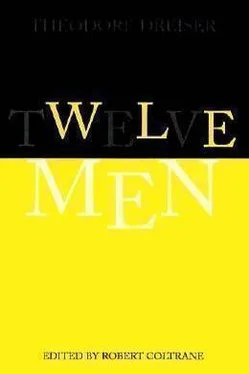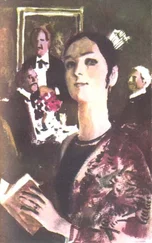Теодор Драйзер - Twelve Men
Здесь есть возможность читать онлайн «Теодор Драйзер - Twelve Men» весь текст электронной книги совершенно бесплатно (целиком полную версию без сокращений). В некоторых случаях можно слушать аудио, скачать через торрент в формате fb2 и присутствует краткое содержание. Год выпуска: 2014, Издательство: epubBooks Classics, Жанр: Биографии и Мемуары, на английском языке. Описание произведения, (предисловие) а так же отзывы посетителей доступны на портале библиотеки ЛибКат.
- Название:Twelve Men
- Автор:
- Издательство:epubBooks Classics
- Жанр:
- Год:2014
- ISBN:нет данных
- Рейтинг книги:4 / 5. Голосов: 1
-
Избранное:Добавить в избранное
- Отзывы:
-
Ваша оценка:
- 80
- 1
- 2
- 3
- 4
- 5
Twelve Men: краткое содержание, описание и аннотация
Предлагаем к чтению аннотацию, описание, краткое содержание или предисловие (зависит от того, что написал сам автор книги «Twelve Men»). Если вы не нашли необходимую информацию о книге — напишите в комментариях, мы постараемся отыскать её.
Twelve Men — читать онлайн бесплатно полную книгу (весь текст) целиком
Ниже представлен текст книги, разбитый по страницам. Система сохранения места последней прочитанной страницы, позволяет с удобством читать онлайн бесплатно книгу «Twelve Men», без необходимости каждый раз заново искать на чём Вы остановились. Поставьте закладку, и сможете в любой момент перейти на страницу, на которой закончили чтение.
Интервал:
Закладка:
For a time now I heard but little more save once that he was connected with a moving–picture concern, suggesting plots and making some money. Then I saw a second series of essays in the same Western critical paper—that of the editor who had published his book—and some of them were excellent, very searching and sincere. I felt that he was moving along the right line, although they earned him nothing. Then one week, very much to my surprise, there was a very glowing and extended commentary on myself, concerning which for the time being I decided to make no comment; and a little later, perhaps three weeks, a telephone call. Did I recall him? (!) Could he come and see me? (!) I invited him to dinner, and he came, carrying, of all things—and for him, the ex–railroad boy—a great armful of red roses. This touched me.
"What's the idea?" I inquired jovially, laughing at him.
He blushed like a girl, a little irritably too, I thought, for he found me (as perhaps he had hoped not to) examining and critical, and he may have felt that I was laughing at him, which I wasn't. "I wished to give them to you, and I brought 'em. Why shouldn't I?"
"You know you should bring them if you want me to have them, and I'm only too glad to get them, anyway. Don't think I'm criticizing."
He smiled and began at once on the "old days," as he now called them, a sad commentary on our drifting days. Indeed he seemed able to talk of little else or fast enough or with too much enthusiasm. He went over many things and people—M―; K―, the wonderful art–director, now insane and a wreck; the group of which he and I had once been a part; his youthful and unsophisticated viewpoint at the time. "You know," he confessed quite frankly finally, "my mother always told me then and afterwards that I made a mistake in leaving you. You were the better influence for me. She was right. I know it now. Still, a life's a life, and we have to work through it and ourselves somehow."
I agreed heartily.
He told me of his wife, children, farm, his health and his difficulties. It appeared that he was making a bare living at times, at others doing very well. His great bane was the popular magazine, the difficulty of selling a good thing. It was true, I said, and at midnight he left, promising to come again, inviting me to come to his place in the country at my convenience. I promised.
But one thing and another interfered. I went South. One day six months later, after I had returned, he called up once more, saying he wished to see me. Of course I asked him down and he came and spoke of his health. Some doctor, an old college pal of his, was assuring him that he had Bright's disease and that he might die at any time. He wanted to know, in case anything happened to him, would I look after his many mss., most of which, the most serious efforts at least, had never been published. I agreed. Then he went away and I never saw him again. A year later I was one day informed that he had died three days before of kidney trouble. He had been West to see a moving–picture director; on his way East he had been taken ill and had stopped off with friends somewhere to be treated, or operated upon. A few weeks later he had returned to New York, but refusing to rest and believing that he could not die, so soon, had kept out of doors and in the city, until suddenly he did collapse. Or, rather, he met his favorite doctor, an intellectual savage like himself, who with some weird desire to appear forceful, definite, unsentimental perhaps—a mental condition L― most fancied—had told him to go home and to bed, for he would be dead in forty–eight hours!—a fine bit of assurance which perhaps as much as anything else assisted L― to die. At any rate and in spite of the ministrations of his wife, who wished to defy the doctor and who in her hope for herself and her children as well as him strove to contend against this gloom, he did so go to bed and did die. On the last day, realizing no doubt how utterly indifferent his life had been, how his main aspirations or great dreams had been in the main nullified by passions, necessities, crass chance (how well he was fitted to understand that!) he broke down and cried for hours. Then he died.
A friend who had known much of this last period, said to me rather satirically, "He was dealing with death in the shape of a medic. Have you ever seen him?" The doctor, he meant. "He looks like an advertisement for an undertaker. I do believe he was trying to discover whether he could kill somebody by the power of suggestion, and he met L― in the nick of time. You know how really sensitive he was. Well, that medic killed him, the same as you would kill a bird with a bullet. He said 'You're already dead,' and he was."
And—oh yes—M―, his former patron. At the time of L―'s sickness and death he was still owing him $1100 for services rendered during the last days of that unfortunate magazine. He had never been called upon to pay his debts, for he had sunk through one easy trapdoor of bankruptcy only to rise out of another, smiling and with the means to continue. Yes, he was rich again, rated A No. 1, the president of a great corporation, and with L―'s $1100 still unpaid and now not legally "collectible." His bank balance, established by a friend at the time, was exactly one hundred thousand.
But Mrs. L―, anxious to find some way out of her difficulty since her husband was lying cold, and knowing of no one else to whom to turn, had written to him. There was no food in the house, no medicine, no way to feed the children at the moment. That matter of $1100 now—could he spare a little? L― had thought—
A letter in answer was not long in arriving, and a most moving M―y document it was. M― had been stunned by the dreadful news, stunned. Could it really be? Could it? His young brilliant friend? Impossible! At the dread, pathetic news he had cried—yes he had—cried—and cried—and cried—and then he had even cried some more. Life was so sad, so grim. As for him, his own affairs were never in so wretched a condition. It was unfortunate. Debts there were on every hand. They haunted him, robbed him of his sleep. He himself scarcely knew which way to turn. They stood in serried ranks, his debts. A slight push on the part of any one, and he would be crushed—crushed—go down in ruin. And so, as much as he was torn, and as much as he cried, even now, he could do nothing, nothing, nothing. He was agonized, beaten to earth, but still—. Then, having signed it, there was a P.S. or an N.B. This stated that in looking over his affairs he had just discovered that by stinting himself in another direction he could manage to scrape together twenty–five dollars, and this he was enclosing. Would that God had designed that he should be better placed at this sad hour!
However that may be, I at once sent for the mss. and they came, a jumbled mass in two suitcases and a portfolio; and a third suitcase, so I was informed, containing all of a hundred mss., mostly stories, had been lost somewhere! There had been much financial trouble of late and more than one enforced move. Mrs. L― had been compelled—but I will not tell all. Suffice it to say that he had such an end as his own realistic pen might have satirically craved.
The mss., finally sorted, tabulated and read, yielded two small volumes of excellent tales, all unpublished, the published material being all but uniformly worthless. There was also the attempt at a popular comedy, previously mentioned, a sad affair, and a volume of essays, as well as a very, very slender but charming volume of verse, in case a publisher could ever be found for them—a most agreeable little group, showing a pleasing sense of form and color and emotion. I arranged them as best I could and finally—
But they are still unpublished.
Читать дальшеИнтервал:
Закладка:
Похожие книги на «Twelve Men»
Представляем Вашему вниманию похожие книги на «Twelve Men» списком для выбора. Мы отобрали схожую по названию и смыслу литературу в надежде предоставить читателям больше вариантов отыскать новые, интересные, ещё непрочитанные произведения.
Обсуждение, отзывы о книге «Twelve Men» и просто собственные мнения читателей. Оставьте ваши комментарии, напишите, что Вы думаете о произведении, его смысле или главных героях. Укажите что конкретно понравилось, а что нет, и почему Вы так считаете.









